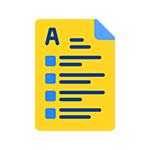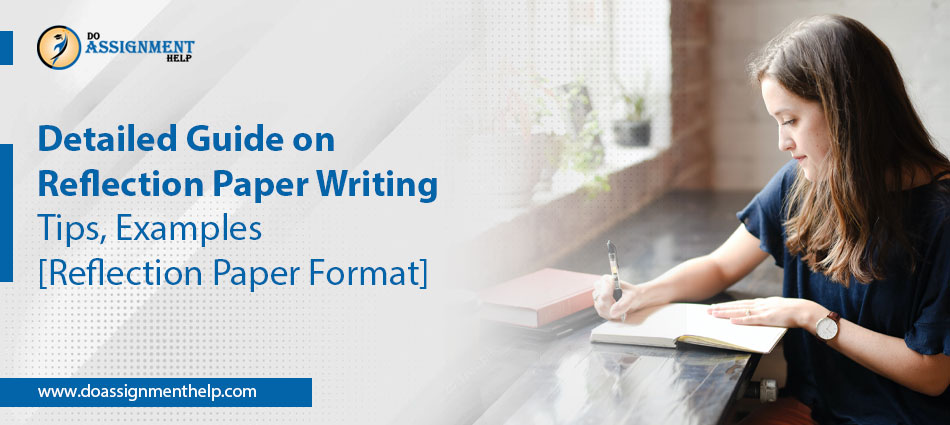The reflection paper is a common type of assignment writing task given to students. Basically, it is meant to share your personal ideas on a topic, experience, or behavior. Now, this might sound quite easy to manage, but drafting a reflection paper is a complicated task. Generally, a reflection paper follows an academic tone where you can be subjective or personal.
In this post, we’ll discuss how to write a reflection paper & obtain high scores. Besides, get ready to check out the outline guidelines & useful tips to produce a solid output.
Also Read: Assignment Help Tips to Complete Papers on Time
Table of Contents
What Is A Reflection Paper?
A reflection paper requires you to share your personal opinions, experiences & knowledge on a particular subject or issue. In such type of an assignment, students need to assess their attitude & feelings towards a topic. Hence, if you’re pondering how to start a reflection paper, make sure to work on your reflective thinking abilities.
It means you must be able to assess the following pointers:
- What action did you take;
- Why & how you did it;
- What did you feel afterward;
- What could’ve been done differently
Therefore, let’s summarize & clarify what is a reflection paper quickly:
- It allows you the opportunity to display critical thinking skills.
- It lets you explore the topic in the depth.
- And it lets you evaluate your ideas, feelings, thoughts, & attitudes.
What Are The Different Types Of Reflection Paper?
A reflection paper can be drafted in three different ways. It all depends on the type you are required to tackle. Each type follows a slightly different tone from another.
Let’s take a quick glance at each type:
- Educational Reflective Paper: These reflection papers consist of writing reviews about a movie, seminar you attended, or a book. The aim is to draft the copy in such a way that it aware the readers about something the topic.
- ExpertReflective Paper: These papers are drafted by students studying or working on brain research or instructions.
- Personal Reflective Paper: In this type of paper, students are required to share their feelings & ideas on a personal subject.
Read More: Controversial Research Paper Topics
How To Write A Reflection Paper? – 5 Crucial Tips That Students Must Follow
Here are some important tips on writing a powerful reflection paper to speed up the results.
Tip #1: Cover The Key Questions
It’s important to take a minute and observe your feelings towards the subject or material you need to write about. There are certain questions you can ask yourself, such as:
- Did you feel positive, negative, or neutral upon coming across the material the first time?
- Does the author, or director seem credible?
- Is there any issue that the material did not acknowledge?
- What are the takeaways from the material or document?
- Did the subject transform your perspective in any way?
- Could you recall any personal experience or something that you’ve watched, heard, or read?
- Have you got any questions on your mind after going through the material?
This step will help you generate an opinion on the subject, conclude & ensure great output.
Moreover, you may check out the reflection paper example to get a clear idea about how to move further.
Tip #2: Identify A Central Theme
The next tip is recognizing a key theme after assessing the questions & your own reactions. If it’s your first time & you’re clueless about how to start a reflection paper, then this strategy would be extremely helpful.
Furthermore, you must observe the key takeaway points. It’ll help you conclude everything quickly. Here, you need to re-evaluate your emotions and the things that you learned.
Be very honest about your feelings. This works wonderfully when there’s a strong sense of opinion from your end.’
Tip #3: Summarize Everything
Students need to understand the reflection paper isn’t limited to summarizing the material. But, it’s critical to recall the significant aspects. Besides, you should mention certain examples if required. It helps support the claims you make in the paper.
Moreover, do mention the details of the author when writing about an article or a book. In the case of a fictional piece, it’s advisable to share a brief summary of the plot. For non-fictional material, the thesis of the author and the key argument can be included.
If you’re struggling to manage this, an assignment help specialist can assist you. Avoid overdoing the summary. Our aim is to share a clear context with the readers. It allows them to understand how you reflected on the topic and assessed the information.
Tip #4: Assess Everything Deeply
Critical thinking skills are highly essential to preparing a well-assessed reflection paper. After including enough context for the readers, assess these points:
- What is the tone of the paper?
- Is the writer credible?
- What are the potential biases?
- What does the material imply?
Tip #5: Link Everything
Can you recall any personal experience related to the material you’ve come across earlier? Try connecting them to real-life events or present-day events happening in your life.
Take a moment to look at the bigger picture. Is there anything the material and your experience have in common? When you focus on this aspect it helps you build a paper with closely-knit ideas.
However, everything must be mentioned precisely in a well-defined reflection paper format. It helps you draft a solid copy with a natural flow of data.
Also Read: Write An Outstanding Research Paper
The Basic Reflection Paper Format For Students
There’s no specific reflection paper format that students are expected to follow. Most of the time, teachers let students draft the reflective assignments as per their independent understanding.
Thus, you are free to share your thoughts without any limitations. Hence, usually, the format of the assignment is set by the assigner.
Let’s have a look at the general format for writing a reflection paper:
- The copy should follow double-spacing.
- The first word in every paragraph should be indented.
- Keep a 1-inch margin on both the sides, as well as on the bottom & the top.
- Choose the texts in “Times New Roman” in 12 pt. size.
- Make sure to apply the 8.5X11″ page.
There are various types of academic formats such as MLA, APA, Chicago, and Harvard. You may hire a professional assignment help expert to draft these tricky papers. They are experienced in producing thoroughly assessed, top-notch quality reflective papers.
How To Outline A Reflection Paper?
You can approach a reflection paper in two different ways:
Approach #1: Write a thesis statement with a central idea. Further, draft relevant paragraphs backed up by supportive claims, facts & arguments. Moreover, don’t forget to conclude everything and support the thesis, again.
Approach #2: Pick a topic, start the discussion & share hints about the conclusion. Here, you need to indicate where the discussion leads you. However, make sure to leave some scope for uncertainty.
Share your assessment of the topic. Then, in the end, present a conclusion completely unrelated to what you mentioned at the start.
Finally, let’s move on and discuss how to write a reflection paper in a proper structure.
1. Introduction
This is the most important part while writing any type of assignment. Since you’re required to express your feelings on the topic, we suggest avoiding being too emotional.
Try to be as reasonable & logical as possible. Remember, this is an academic paper, and approach it accordingly. The skilled assignment help masters suggest keeping the introductory paragraph insightful. It will hook the readers and compel them to read further. Besides, that’s the best way to let your audience know what they can expect from the write-up.
The idea is to develop a powerful theme. Moreover, draw attention to the key argument using a single sentence. How? You may ask.
- Make sure it is captivating, concise & informative.
- Here, try to include a reflective question.
- Avoid starting with a thesis. You will get enough chances to return to it later.
And, that’s our recommendation on how to start a reflection paper for amazing results.
2. Body
Once you’ve formulated well-thought & insightful information, comes the body. In this part, you must reflect upon & explore the thesis statement.
The body consists of multiple paragraphs. Each paragraph focuses on a topic idea. Generally, the three-paragraph rule works.
In the first paragraph of your reflection paper, talk about the entire experience and its influence on your thoughts.
Then, move ahead and draw a comparison between the experiences of other individuals. Further, share your learning from it.
Take care of the following things:
- One of the best ways to start the body is by sharing the reasons to pick the subject.
- Always be logical in your arguments & claims.
- Rather than focusing on what’s on the surface, it’s better to go a bit deeper. Explain the details clearly.
- Some examples & source citations would be extremely helpful.
- You must include how the subject impacted you.
3. Conclusion
Make sure the conclusion is solid and enticing. Students often do not pay enough attention while writing the conclusion. But, understanding how to end is as critical as how to start a reflection paper.
As you wrap up the reflection paper, it shows that you are well aware of the topic and ideas you’ve mentioned in it. Here, you must include the vital points. Besides, share a quick insight about the experience. It would let the readers reflect upon the entire issue clearly.
Focus on the following points to ensure a good conclusion:
- Highlight the key points of your write-up.
- The conclusion should be persuasive & effective.
- Share the answers to the questions you specified in the introduction.
Step-By-Step Process To Prepare An Impressive Reflection Paper
Step #1: Create A Central Theme
Select a key topic and summarize your experiences related to the topic. This is your chance to share your ideas and feelings related to the subject, and discuss them honestly.
It allows the readers an insight into your thinking, & feelings. Moreover, that’s the best way to give them a clear idea of how you reflect on it.
Step #2: Brainstorm The Ideas
It’s important to jot down a few things, such as:
- Certain quotes
- Any predispositions you may have
- Anything that influenced you
- Things that are memorable for you
Furthermore, it’s best to keep giving a personal touch & explain everything in simple language. Don’t forget to discuss what and how you felt about the material.
You may discuss these points with assignment help experts as they are experienced in the field. Book a session with an expert to ideate before drafting the reflective paper.
Let’s look at a few examples:
- Many individuals think that eating carbs in small amounts may result in weight gain.
- There was a time when I gained excessive weight and had to eliminate carbs from my diet.
- What actions did I take that compelled me for the research?
- Some crucial scientific evidence that indicates carbs are the major cause of obesity in people.
- How I adapted to a healthy diet and the experiences of following a well-balanced nutrition-rich diet.
- How have other peoples’ outlooks influenced me in accepting the harmful effects of carbs? And how did their influence impact me?
- What are the new ideas I adapted after my perspective about carbs transformed?
Step #3: Analyse The Impact Of Your Experiences On Interpreting The Theme
After you go through the exercise mentioned in the above step, choose an idea or experience. Further, assess it well by digging in deep. Moreover, you need to share a reason that made you accept or reject that idea.
A quick look into any well-written reflection paper example would help you understand these points.
Step #4: Link Your Observations, Experiences & Opinions
It’s important to create a link between your ideas & insights on the topic to build a tightly-written reflection paper. Try to identify, and disintegrate your suppositions which could approach later on.
You may pick any one of the below-mentioned subjects that are quite common among students:
- Book: Begin by providing some details about the author’s biography and give a summary of the plot. Do not disclose the end to the readers. It helps retain their interest.
The name of the characters, core theme, and problems in the book should be specified clearly. At the end of your reflection paper, share your ideas & reflect on the book in your hand.
- Course: So, how to start a reflection paper about a course? Begin by mentioning the name of the course and share a brief description.
Moving ahead, discuss how the information in the course flows. Besides, share the reasons that compelled you to take up the course. Further, share your takeaways from the course.
While writing a reflection paper do share your opinions and back them up with relevant examples mentioned in the course.
- Project: Many students are confused about how to write a reflection paper about a project, the guidelines are similar to the course. Do mention the pros & cons of the course in the paper.
Moreover, are there any alterations you wish to have to the paper? Specify them.
- Interview: Start with introducing the person and share a brief description of the interview. Moreover, do cover the key points, controversies, and your opinions on the person in question.
Additional Tips To Write A Reflection Paper Quickly & Score Higher
- Keep It Short: The usual length of the reflection paper is somewhere between 250 and 750 words. Do not include unnecessary information.
- Maintain The Clarity: It’s important to maintain clarity in your write-up. The thesis should be solid.
- Be Careful Of The Tone: Follow either academic or professional tone in the reflection paper. This rule is applicable even when writing on a personal matter.
- Source Citation: Support your personal opinions by citing genuine sources and field experts.
- Proofread & Edit: This is yet another important step while drafting any type of assignment. Thus, focus on proofreading the paper for issues related to grammar, spelling, punctuations, etc.
Besides, carefully assess the reflection paper format & organization of the data. Make sure to check whether or not you’ve answered everything mentioned in the introductory part.
Bottom Line
While working on a reflection paper, students need to work through multiple layers. Hence, it could be a bit confusing. Our blog aims to eliminate any chance of speculations and simplify your understanding. Moreover, make sure you proofread everything to keep the information organized.
There are several assignment help agencies that you may consider for outsourcing your reflective paper writing. The subject matter experts excel in producing the finest quality output. Consequently, it becomes easier for you to maintain a hassle-free academic life and score better.
Read more: Economics Research papers topics for students
We hope you found this post insightful!
 Santa Clara, CA 95050
Santa Clara, CA 95050 





